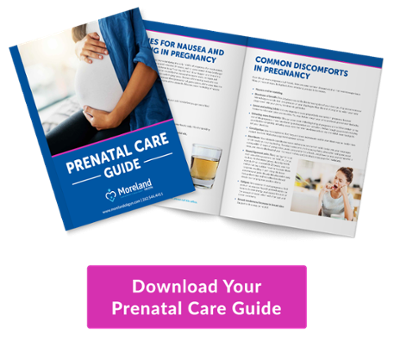
We can all agree pregnancy is a joyful, rewarding, and life-changing experience. But it also comes with important decisions and some unpleasant side effects to contend with. Given all this, it’s ok to admit that sometimes pregnancy can be stressful and challenging.
Wouldn’t it be nice if there were natural remedies available to help combat pregnancy stress, morning sickness, or nausea? Good news: essential oils may offer some support. However, it's important to understand that every obstetrician has their level of comfort in talking with patients about essential oil use during pregnancy. If you are pregnant, please speak with your Moreland OB-GYN doctor before you incorporate any essential oil into your routine.

Essential Oil Basics
Essential oils are a class of evaporative aromatic oils derived from plants. Within their plant hosts, the oils are responsible for providing the plant’s characteristic smell, attracting beneficial organisms, repelling harmful parasites, and helping the plant reproduce, regenerate, and heal.
Ancient Greeks, Romans, and Egyptians are credited among the first humans to harness the many capabilities of essential oils. These ancient peoples developed the techniques used to extract essential oils from their natural plant habitats via distillation and pressing. They used essential oils for their healing and medicinal properties, for cosmetic purposes, and to aid in spiritual meditation and relaxation.
Today we realize these same regenerative, healing, soothing, and aromatic benefits when essential oils are inhaled, diffused, ingested, or applied topically to the skin. Our selection of essential oils has expanded from that of our ancient ancestors as distillation and pressing processes continue to grow in sophistication.
Essential Oils and Pregnancy
So, you may be thinking: natural healing, regenerative, and calming benefits all sound great, but are essential oils safe to use during pregnancy? The answer is yes, with a few special considerations.
First, it’s important to choose your essential oils with care. Select a reputable essential oil provider that delivers pure, high-quality, therapeutic-grade essential oils with an emphasis on scientific testing and responsible sourcing. The best essential oils are 100% plant-derived without fillers or byproducts.
Next, always exercise caution with essential oil use, specifically during the flurry of development in your first trimester. Also, avoid the essential oils listed below in the "don’ts" section.
Finally, pregnant women should avoid ingesting and topically applying undiluted essential oils throughout pregnancy. Instead, try inhaling essential oils or adding them to a diffuser. If you elect to apply essential oils to your skin, make sure they’re diluted with a carrier oil and test a small area of your skin for sensitivity before general use.
Essential Oils That May Be Safe During Pregnancy
Many nontoxic essential oils are approved for use during pregnancy and can help combat some of the more unpleasant but common pregnancy symptoms.
While some essential oils may be safe to use during pregnancy, their safety may depend on the trimester or method of use. For example, some oils are only recommended for use during the second and third trimesters, which is why it's important to always exercise caution and consult your doctor before using essential oils during pregnancy.
 Here’s a list of pregnancy-safe essential oils to get you started.
Here’s a list of pregnancy-safe essential oils to get you started.
- Cardamom
- Ginger
- Eucalyptus
- Frankincense
- Grapefruit
- German or Roman Chamomile
- Lavender
- Mandarin
- Neroli
- Petitgrain
- Rose or Rosewood
- Lemon
- Sandalwood
- Tangerine
- Wild Orange
- Ylang Ylang
You should always consult your provider before incorporating any essential oils into your routine during pregnancy. This ensures you're keeping yourself and your baby safe.
Essential Oils to Avoid During Pregnancy
The list of essential oils provided below should be avoided during pregnancy. Refrain from using:

- Aniseed
- Basil
- Birch
- Camphor
- Cinnamon Bark
- Clary Sage
- Clove
- Cumin
- Geranium
- Hyssop
- Mugwort
- Nutmeg
- Oak Moss
- Parsley Seed or Leaf
- Pennyroyal
- Peppermint
- Rosemary
- Rue
- Sage
- Tansy
- Tarragon
- Thuja
- Thyme
- Wintergreen
- Wormwood
Again, it’s critical to discuss the use of essential oils with your obstetrician or gynecologist. Every woman’s pregnancy, symptoms, and potential risk factors are unique. Your doctor should be your first resource for questions about essential oil use and other pregnancy-related concerns.
Talk to Your Doctor
There are many benefits to essential oil use during pregnancy, but as we discussed, certain oil types and application methods should be handled with care or avoided entirely. If you’re looking to learn more about essential oils and pregnancy or have other questions, the team of doctors at Moreland OB-GYN are here to help!
 At Moreland OB-GYN, we specialize in women’s health care and prioritize the needs of our patients. We hope you’ll connect with us to help answer your questions and we hope you’ll turn to our experts as a trusted resource for information. Download your prenatal care guide now!
At Moreland OB-GYN, we specialize in women’s health care and prioritize the needs of our patients. We hope you’ll connect with us to help answer your questions and we hope you’ll turn to our experts as a trusted resource for information. Download your prenatal care guide now!
Looking for more pregnancy resources? We’ve got you covered!











